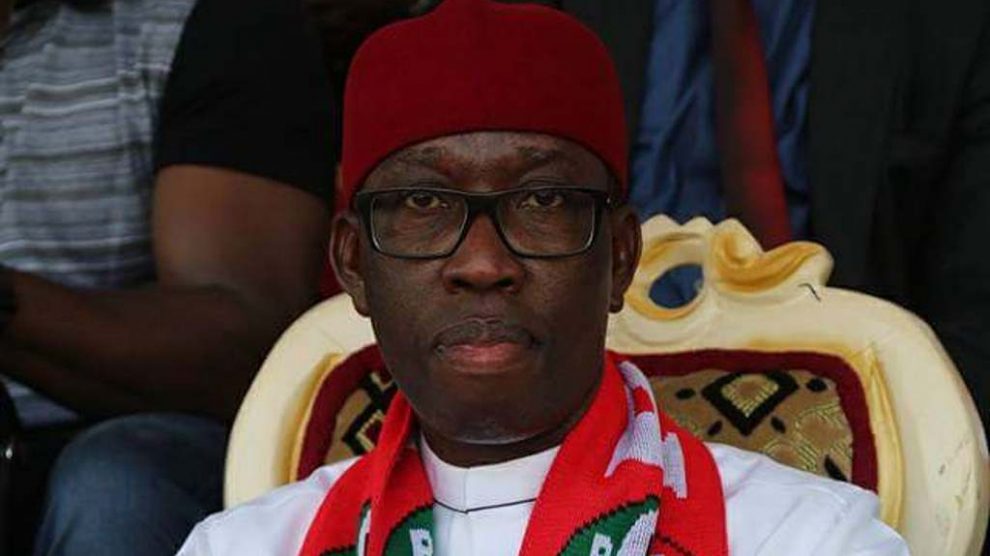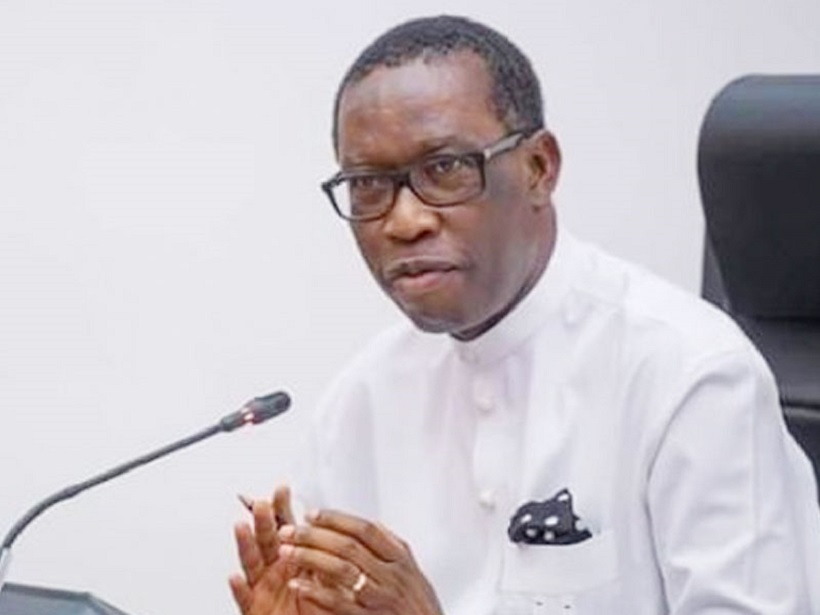General
Delta Got 988% More Revenue Than Osun in H1 2018—NEITI

By Modupe Gbadeyanka
A total of N3.95 trillion was shared among the federal, states and local government areas of the federation in the first half of 2018 from the Federation Account.
A statement from the Nigeria Extractive Industries Transparency Initiative (NEITI) signed by its Director of Communications and Advocacy, Dr Orji Ogbonnaya Orji, disclosed that the disbursements made by the Federation Accounts Allocation Committee (FAAC) represented an increase of 41 percent when compared to the N2.79 trillion disbursed in the first half of 2017 and a 95 percent increase in the N2 trillion disbursed in the first half of 2016.
According to the latest edition of the NEITI Quarterly Review, a breakdown of the disbursements showed that the federal government received N1.65 trillion, states received N1.38 trillion while local governments got the least share of N795 billion during the period under review.
The disparity in the revenues received by each of the three tiers of government was based on the revenue sharing formula of the federation as stipulated in the constitution.
The NEITI Quarterly Review shows that the lowest monthly figure of N635.6 billion disbursed in the first half of 2018 was N121.4 billion higher than the highest monthly figure (N514.2 billion) disbursed in the first half of 2017 and N218 billion higher than the highest monthly figure (N417 billion) for 2016.
“These figures clearly indicate that revenue accruing to the Federation in the first half of 2018 completely outstripped revenues in the previous two years,” stated the report.
The Quarterly Review further disclosed that total FAAC disbursements in the second quarter of this year was 46 percent higher than the figure for the same period last year and 127 percent higher than the figure for the same period in 2016.
The report noted that while N2 trillion was shared in the second quarter of this year, N1.38 trillion was disbursed during the same period last year and only N886.38 billion was shared in the second quarter of 2016.
“In fact, Q2, 2018 was the first time an amount in excess of N2trillion was disbursed since Q3 2014. This is a run of 14 consecutive quarters of disbursements below N2trillion,” it said.
The phenomenal increase of disbursements recorded in the second quarter of 2018, the report observed, was the highest to the Federation since the third quarter of 2014.
The report attributed the positive development to the rise in crude oil prices and similar increase in oil production.
“Average oil price in 2016 was $43.5 per barrel, while in 2017 oil price averaged $54.2 per barrel. However, in the first six months of 2018, average oil price was $70.6 per barrel. Thus, on the average, oil price increased by 62.2 percent between 2016 and the first half of 2018,” the NEITI Quarterly Review asserted.
“Total oil production in 2016 was 661.1 million barrels while the figure was 690 million barrels in 2017. In 2016, average monthly oil production was 55.1 million barrels while it was 57.5 million barrels in 2017. For the first two months of 2018 for which data is available, average production was 59 million barrels.”
On net FAAC disbursement to states, the review disclosed that during the first half of this year, “the highest receiving state was Delta State with N101.19 billion, while the lowest receiving state was Osun State with N10.24 billion. This implies that Delta State received 988 percent more than Osun State received.”
NEITI postulates that since “disbursements to all states as at June 2018 exceeded 60 percent of total disbursements in 2017, it is also likely that FAAC disbursements to all states in 2018 will exceed their 2017 values.”
The NEITI Quarterly Review also looked at the deductions made from the allocations to the states. The report identified five states with the lowest deductions as a percentage of disbursements as Anambra (2.89 percent), Yobe (2.93 percent), Jigawa (3.96 percent), Enugu (6.72 percent), Nassarawa (6.74 percent).
In the same direction, states with the highest deductions as percentage of disbursements were Plateau (33.48 percent), Ogun (38.43 percent), Zamfara (41.55 percent), Cross River (54.53 percent) and Osun (141.79 percent).
Another striking feature of the NEITI Report is the significant increase in VAT disbursements during the period under review.
VAT disbursements increased by 35 percent between the first quarter of 2015 and the second quarter of 2018.
The report remarked: “It is interesting that VAT has been generally increasing over time. This bodes well for the government’s efforts at increasing revenue from non-oil sources.”
The NEITI Quarterly Review expressed hope about increased revenues to governments from both oil and non-oil sectors, but cautions that the volatile and unpredictable nature of government revenues will continue to make planning difficult for all tiers of government, increasing difficulties in implementing their budgets.
It highlighted the need to place priority attention to internally generated revenues. The latest issue of the publication is based on data from the National Bureau of Statistics (NBS) and NEITI’s regular attendance at FAAC meetings.
General
INEC Shifts 2027 Presidential, N’Assembly Elections to January 16

By Adedapo Adesanya
Nigeria will hold next year’s presidential and National Assembly elections a month earlier than planned, after the Independent National Electoral Commission (INEC) revised the polling schedule.
The elections will be held on January 16, instead of the previously announced date of February 20, INEC said in an X post, signed by Mr Mohammed Kudu Haruna, National Commissioner and Chairman, Information and Voter Education Committee.
There were also changes to the Governorship and State Houses of Assembly elections initially fixed for Saturday, March 6 2027, in line with the Electoral Act, 2022, have now been moved to Saturday, February 6, 2027.
The electoral commission said the changes were caused by the enactment of the Electoral Act, 2026 and the repeal of the Electoral Act, 2022, which introduced adjustments to statutory timelines governing pre-election and electoral activities.
“The Commission reviewed and realigned the schedule to ensure compliance with the new legal framework,” it said.
INEC said party primaries (including resolution of disputes) will commence on April 23, 2026 and end on May 30, 2026, after which Presidential and National Assembly campaigns will begin on August 19, 2026, while Governorship and State Houses of Assembly campaigns will begin on September 9, 2026.
It noted that campaigns will end 24 hours before Election Day, and political parties have been advised to strictly adhere to the timelines.
INEC also stated it will enforce compliance with the law.
The electoral body also rescheduled the Osun Governorship election which was earlier scheduled for Saturday, August 8 2026, by a week to Saturday, August 15, 2026.
INEC noted that some activities regarding the Ekiti and Osun governorship elections have already been conducted, and the remaining activities will be implemented in accordance with the Electoral Act, 2026.
Speaking at a news briefing in Abuja two weeks ago, the chairman of INEC, Mr Joash Amupitan, expressed the readiness of the commission to conduct the polls next year.
The timetable issued by the organisation for the polls at the time came when the federal parliament had yet to transmit the amended electoral bill to President Bola Tinubu for assent.
Later that week, the Senate passed the electoral bill, reducing the notice of elections from 360 days to 180 days, while the transmission of results was mandated with a proviso.
General
NIMASA Rallies Stakeholders’ to Develop National Action Plan

By Adedapo Adesanya
The Nigerian Maritime Administration and Safety Agency (NIMASA) has pledged its commitment to provide the regulatory leadership, technical coordination, and stakeholder engagement required to successfully develop and implement a robust National Action Plan on maritime decarbonization in Nigeria.
The Director General of the agency, Mr Dayo Mobereola, made this known during the National Stakeholders’ workshop on the development of a National Maritime Decarbonization Action Plan, further describing the workshop as a critical step in actualising the Federal Government’s blue economy and climate objectives.
Represented by the Executive Director, Operations, Mr Fatai Taiye Adeyemi, the NIMASA DG underscored the significance of the IMO GreenVoyage2050 Project, a technical cooperation initiative /designed to support developing countries in implementing the IMO GHG Strategy.
According to him, the National Action Plan being developed will reflect national realities, leverage existing capacities, address identified gaps, and align with broader economic and environmental priorities of the federal government.
Mr Mobereola stressed that “this transition is not merely about compliance with international obligations, it is about safeguarding our marine environment, protecting public health, strengthening the blue economy, and ensuring that our maritime industry remains competitive and future-ready”, the DG said.
Also speaking at the event was the Technical Manager of the IMO GreenVoyage2050 Project, Ms Astrid Dispert, who highlighted that the overarching objective of the initiative is to advance a coherent and globally aligned regulatory framework to accelerate maritime decarbonization.
She also emphasised that NIMASA plays a pivotal role in driving the project at the national level.
The IMO GreenVoyage2050 Project provides technical expertise and institutional support to assist countries in developing and implementing National Action Plans that promote sustainable shipping practices, encourage investment in clean technologies, and strengthen capacity for long-term emissions reduction.
Through this collaboration, the federal government is advancing deliberate steps towards maritime decarbonization, reinforcing its commitment to global climate goals and ensuring a cleaner, greener, and more sustainable future for the sector.
General
BPP Mandates Digital Submission for MDAs From March 1

By Adedapo Adesanya
The Bureau of Public Procurement (BPP) has directed all Ministries, Departments and Agencies (MDAs) to comply with its digital submission process effective March 1.
The directive was contained in a circular signed by the Director-General of the Bureau, Mr Adebowale Adedokun, noting that the move was part of the bureau’s commitment to digital transformation and paperless governance.
It explained that the transition followed an earlier circular of Aug. 4, 2025, which introduced electronic submission procedures.
According to the bureau, it has successfully moved from physical filings to a dedicated e-mail service for document submissions and is now advancing to a more robust and integrated system.
The circular announced the inauguration of the BPP Digital Submission Portal, a web-based platform designed to enable MDAs submit procurement-related documents directly to the Bureau.
It stated that the automated platform would streamline the submission process, enhance transparency and ensure accelerated tracking of procurement-related documents and petitions.
“With effect from March 1, all MDAs will be required to use the portal to submit requests for ‘No Objection’ Certificates, approvals for ‘No Objection’ for special procurements, clarifications and status updates on submissions,” the bureau said.
It added that the portal would be hosted on the Bureau’s official website and would become fully operational from the effective date.
The bureau warned that physical submissions or manual hand-deliveries would no longer be prioritised and would eventually be rejected following the full transition to the digital platform.
It urged accounting officers to brief their procurement departments and ICT units on the development to ensure seamless processing of procurement activities from March 1.
It further advised MDAs to contact the Bureau via its official email for information on the onboarding process and integration into the portal.
The bureau emphasised that full compliance by all MDAs was required to ensure a smooth transition and avoid delays in the implementation of the 2026 fiscal year procurement processes.
-

 Feature/OPED6 years ago
Feature/OPED6 years agoDavos was Different this year
-
Travel/Tourism10 years ago
Lagos Seals Western Lodge Hotel In Ikorodu
-

 Showbiz3 years ago
Showbiz3 years agoEstranged Lover Releases Videos of Empress Njamah Bathing
-

 Banking8 years ago
Banking8 years agoSort Codes of GTBank Branches in Nigeria
-

 Economy3 years ago
Economy3 years agoSubsidy Removal: CNG at N130 Per Litre Cheaper Than Petrol—IPMAN
-

 Banking3 years ago
Banking3 years agoSort Codes of UBA Branches in Nigeria
-

 Banking3 years ago
Banking3 years agoFirst Bank Announces Planned Downtime
-

 Sports3 years ago
Sports3 years agoHighest Paid Nigerian Footballer – How Much Do Nigerian Footballers Earn













